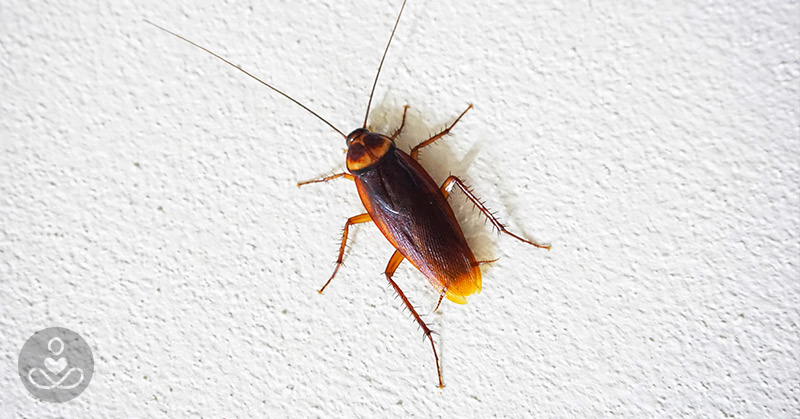This article was originally published on April 4th, 2019 and has since been updated.
Before stumbling upon this study, I didn’t know there was such a thing as cockroach milk. I’m extremely katsaridaphobic, but this may have overridden my morbid fear of these flying villains. Almond milk, soy milk, buffalo milk; they may have nothing on good ole cockroach milk.
Described as a powerhouse of nutrients, milk from the Pacific Beetle cockroach is the latest thing about to rock the health-conscious world. The Diploptera punctata, native to Australia, China, Hawaii, Fiji, and India, is the only known cockroach species that produces milk [1].
This research was conducted by bio-scientists across the U.S. and Europe and was published in the Journal of the International Union of Crystallography [2]. A 40-day-old female has the ability to secrete crystalloid protein molecules in a pale yellow liquid, with which it nourishes its offspring. Quick heads up: you do not want to see an image of a lactating cockroach. I did, and I haven’t recovered.
8 times more nutritious that almond milk
In other news, this milk is gearing up to be one of the most nutritious things on earth. According to the report, it is secreted in the cockroach’s brood sac (uterus) and imbibed by the embryo, which is said to quickly develop pharyngeal muscles. The milk contains every one of the nine essential amino acids required for human cell growth. It is high in calories and fats, containing a lot of essential lipids which the human body can’t normally produce on its own.
Speaking to Times of India, top researcher Sanchari Banerjee said: “The crystals are like a complete food – they have proteins, fats, and sugars. If you look into the protein sequences, they have all the essential amino acids.”
According to the study, the milk “is estimated to contain more than three times the energy of an equivalent mass of dairy milk.”
It was analyzed and found to contain 45% protein, 5% free amino acids, 22% lipids, and 25% carbs[3]. Essentially, with this incredible fusion of nutrients, it’s safe to say that cockroach milk is a total superfood (minus the cockroach part).
Are There Any Downsides To Cockroach Milk?
Dr. Rachel Nazarian, skin care specialist at Schweiger Dermatology Group, expertly advises against testing out cockroach milk when it comes to skin health [4].
“The levels of growth hormone in this particular liquid are unknown, and there is evidence that shows that growth hormones may exacerbate acne in certain individuals,” said Dr. Nazarian to Marieclaire.com. “The high levels of sugar may also make it a poor choice in terms of skin health and beauty, as we know that high-sugar diets actually accelerate skin aging.” [4]
However, despite the fact that cockroach milk may negatively affect your skin, it’s got other beauty advantages. “Protein and fat are vital components of good hair and nails, and this particular liquid may make getting optimal levels of both things much easier,” Dr. Nazarian explains.
The Big Question: How In The World Do You Milk A Cockroach?
The process is not only mortifying, but it’s also not a feasible one. To produce 100 grams (10cl) of roach milk, they’d have to put down about a thousand cockroaches [5]. This is one of the reasons why the product hasn’t hit the market yet. Added to this is the fact that it’s not exactly easy to extract the milk. The scientists have to use a scalpel to cut out the midgut of the cockroach. The midgut contains the brood sac (uterus), in whose walls the milk is secreted. The process is grueling, difficult, and highly unrewarding. And did I mention the cockroaches will have to die for the extraction to happen?
A lot of research is still going on to discover easier methods of extracting the milk and making it commercially available.
A good path to tread would be converting the protein crystalloids into pills or tablets. An estimated 100 cockroaches would produce about ten 1000mg tablets. The milk could still do the body a lot of good upon oral ingestion.
As long as you’re not thinking about the fact that it comes from brown, flittering critters, you’ll most likely have no trouble consuming it. After all, insects are the food of the future… right?
Sources
- https://www.livescience.com/53480-cockroach-pregnancy-unraveled.html
- https://journals.iucr.org/m/issues/2016/04/00/jt5013/
- https://www.sciencedirect.com/science/article/pii/0020179077900233
- https://www.marieclaire.com/beauty/news/a21924/cockroach-milk-benefits/?fbclid=IwAR1f_RiyvjrvmTZL0VKqmwuyy2JUgKIrBnq4ZDVeitKJPeM04pSK5NtAcMc
- https://www.inverse.com/article/19066-cockroach-milk-what-is-it
- https://www.fearof.net/fear-of-cockroaches-phobia-katsaridaphobia/
- https://www.healthline.com/nutrition/essential-amino-acids

